AI meets Entrepreneurs - Medical AI
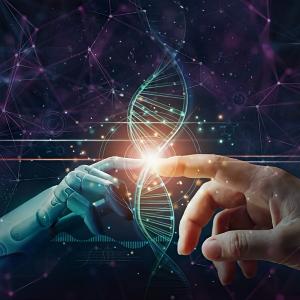

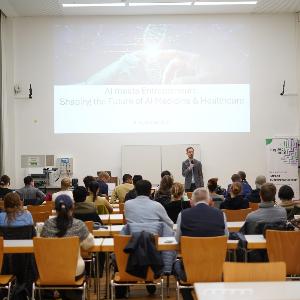
On November 8-9, 2024, we hosted the third edition of the Impact Event Series on "AI Meets Entrepreneurs" bringing together students, researchers, and industry experts to explore the intersection of artificial intelligence and healthcare innovation. The two-day boot camp on the future of AI medicine and healthcare, organized by the LMU Media Informatics Group, Munich Center for Machine Learning (MCML), and impACTup! from the LMU Innovation and Entrepreneurship Center, offered a unique blend of expert insights and hands-on entrepreneurial experience for a crowd of interdisciplinary and international students. Find out more about the inspiring two days here!
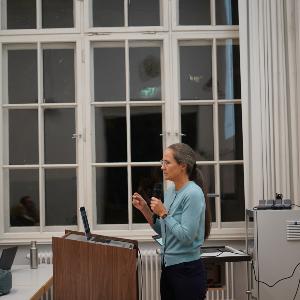
The event kicked off in the Kleine Aula in LMU's historic Main Building with welcome addresses from Dr. Dominik Domnik (LMU IEC) and Dr. Thomas Meier (MCML), before participants could enjoy three keynotes from the research field, start-up context, and the Bavarian entrepreneurship ecosystem.
Susanna Hofmann - Pioneering Research for Personalized Strategies in Cardiometabolic Health with a Focus on Sex Differences
Susanna Hofmann (Helmholtz Munich & Medical Faculty at LMU Munich) delivered an inspiring keynote on how knowledge of molecular mechanisms can improve cardiometabolic health and the early-on and accurate detection of cardiovascular diseases, advancing especially women’s health. "Women have more years with poor health compared to men, and we need better tools to diagnose and treat these differences," noted Prof. Hofmann. She emphasized how traditional metrics such as the Body-Mass-Index prove insufficient to diagnose obesity, which leads to an increased risk for diabetes. Not all body types are the same, and there is also a significant difference in the type and distribution of body fat between the sexes. Therefore, we need both new measures and new tools to assess the type of body fat and its distribution to enhance diagnosis and offer better and earlier treatment. Her presentation unveiled groundbreaking research using non-traditional biomarkers and advanced imaging techniques for early diabetes detection, highlighting crucial sex differences in medical treatment and emphasizing the future potential for AI to help analyze complex biomarker data.
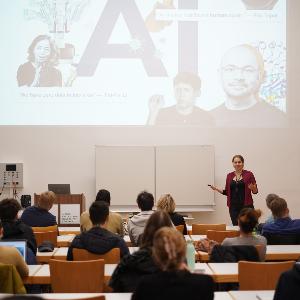
Julia Yukovich - Success Story AICU: From Hackathon to First Customer
The medical AI start-up AICU showcased its innovative solution for streamlining medical research data and facilitating statistics and data science for researchers. Handling messy and complex data in an easy way is thus crucial to enable fast and targeted innovation. So far, researchers have used up to 45 programs to clean, process, analyze, and visualize their data. "We started at a hackathon. We just knew we love data," shared Julia Yukovich from AICU. Their journey from a hackathon to the LMU Innovation Incubator to developing automated pipelines for medical data analysis demonstrates the potential of research- and student-led innovation. AICU’s USP centers on providing one tool for all data formats. It is automated, requires little coding knowledge, and utilizes multimodal and explanation AI. Crucial for future entrepreneurs, Julia also emphasized the need and possibility to acquire funding through grants and get support from mentors and research institutes.
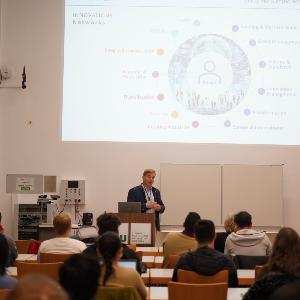
Jörg Traub - Digitalization and AI in Healthcare in Bavaria: What’s out there?
Jörg Traub from Bayern Innovativ provided a comprehensive overview of Bavaria's digital health ecosystem. He introduced Bayern Innovativ, an innovation agency that focuses on networking and matchmaking for entrepreneurs. “We provide connections for structured dialogues and moderated discussions”, Jörg explained. Bayern Innovativ features innovation networks (focused on topics such as health, security, and many more) and innovation services (such as grant management, start-up guides, and more). "Get practical advice from someone who is already in the space," advised Jörg Traub. With more than 1000 partners, the innovation network focusing on health is a starting point for reaching out to consulting agencies, hospitals, start-ups, and other companies in the sector. At the end of his keynote, he emphasized the importance of understanding 1) the user and context, 2) the business model, and 3) the technology needed to build a successful start-up in healthcare innovation.
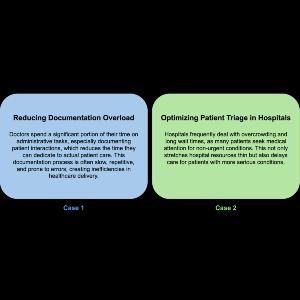
After a short break to let the rich input sink in, it was time to move to the hands-on part for the students. In the next step, the problems for the Hackathon on Saturday were introduced. Students could choose between two cases:
In three moderated roundtable discussions, students were then invited to share their ideas related to these challenges or bring in their expertise. In these roundtable discussions, participants shared their experience and their professional background from various areas and also their personal connection and care for the topics. Together, they then explored the possible dimensions and criteria that should be considered when developing a business idea: from the different target groups (patients, medical professionals, hospital management) to the complex dimensions (automatization, ethical decision-making, and human-AI cooperation).
After a first day full of expertise, pressing needs and questions for healthcare and AI, and vibrant ideas, it was time for some networking, laughter, and a few slices of pizza to end the evening.
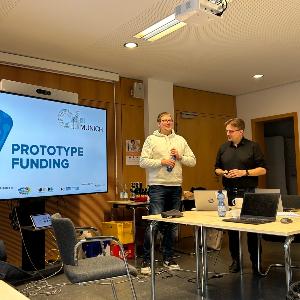
The second day transformed theory into practice at RAW (Referat für Arbeit und Wirtschaft), where participants formed teams supported by an experienced coaching team.
To kick off the day, Dominik Domnik (LMU IEC) gave a short input on impact entrepreneurship. He emphasized how entrepreneurship can drive positive social change, centering on people, the planet, and profit. He also introduced the students to the pitch template for their big moment in front of the jury at the end of Day 2.
Three teams with a total of 10 students worked on three different topics during the day, supported by five coaches from various areas: Christina Hufeld (LMU IEC), Dominik Domnik (LMU IEC), Fabian Heil (Munich Innovation Ecosystem), Philipp von Törne (AI+MUNICH), and Luke Haliburton (MCML).
At 4.00 pm, it’s only an hour until the teams are ready to pitch in front of the jury. Fabian Heil (Munich Innovation Ecosystem), Roman Götter (Bayern Innovativ), Jelena Spanjol (Head of the Institute in Innovation Management at LMU & LMU IEC) & Dominik Domnik (LMU IEC) evaluated and gave feedback on the teams’ pitches according to the following criteria:
Team ClarDoc presented their innovative real-time and personalized audio transcription and translation app designed specifically for healthcare settings. Their solution addresses the critical communication gap in medical consultations, offering both real-time translation and medical jargon explanations to patients. With their ideas, medical consultation will become more accessible and transparent, overcoming language barriers and facilitating patient-doctor communication for better treatment. Emphasizing their focus on patients with their claim, "You are the priority, not your doctor's paperwork," ClarDoc targets non-German speakers and also includes future target groups such as individuals with disabilities. The jury's feedback highlighted both strengths and potential challenges. They raised important concerns about doctor resistance and budget constraints. This exchange led to a productive discussion about their implementation strategy. Further, it provided valuable advice about market entry, suggesting they focus on securing doctor partnerships first while praising their clear problem articulation and storytelling.
Team ERNext presented an AI-powered emergency room triage and patient management system, aiming to improve patient flow and experience in emergency departments. Their solution, targeting the 10.5 million annual emergency room (ER) patients in German public hospitals, combines AI-powered triage decision support with patient surveys and an LLM assistant for information summary. With their app, patients could get early personalized feedback in non-urgent cases, sensitizing them for urgency and capacity overload in the ER while providing an improved patient experience during long and potentially frustrating waiting times. The jury's feedback praised their approach but also highlighted some areas for improvement. The jury wanted more specific information on their technical approach, arguing that the core issue was also organizational rather than merely technological in the ER's extreme situations. The team was convinced of their solution's ability to improve the experience for non-urgent cases, and the jury pointed them to the potential to better connect the identified problem and their proposed solution.
Team AI-MED pitched an ambitious AI-powered personalized medical platform focused on holistic health analysis. Their solution incorporates machine learning for multi-dimensional health analysis and diagnosis, including psychological and social factors, targeting healthcare providers and insurance companies within an estimated 1.3 billion market potential. Such a holistic approach in healthcare could provide an early detection of diseases and help to identify the root causes that remain hidden in a unidimensional assessment of the patients. The jury's feedback centered primarily on implementation challenges and data requirements. They nudged the team to define their starting point for such a comprehensive project more precisely and to highlight existing extensive data sets as a strength for their project early on. The jury's advice emphasized the need to better showcase their data advantage and refine their presentation strategy. They suggested starting with the "why" before explaining the "how" and recommended highlighting the social aspects of their solution more prominently in their pitch.
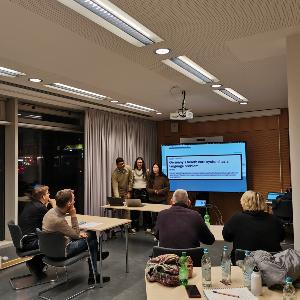
After the three inspiring pitches, the jury took a moment to debate and decide on the winner.
And the winner is… Team ClarDoc!
The jury announced Team ClarDoc as the winner. They praised the precise and defined problem statement as well as their ambitious scoping of potential target groups, and congratulated them on the clear problem and solution fit. “We could see that there is a product out there”, Jelena Spanjol emphasized. The prize for the winning team is a 6-month co-working place at the LMU IEC and entrepreneurship coaching to nourish their idea further.
Concluding the day, Jelena Spanjol emphasized that there is a lot of potential in all three pitches and that this is a great first start to develop these ideas in the future. Jury member Roman Götter encouraged all teams: "Every pitch is great if you do it. And the next pitch is even better.” All jury members motivated the teams to continue their start-up journey, network and mingle in Munich’s entrepreneurship ecosystem, and further nourish their ideas to foster future innovation with societal impact.
Two inspiring days full of expert input from the fields of medical health, artificial intelligence, and entrepreneurship, as well as dedicated and creative engagements by a team of interdisciplinary and international students, leave us inspired and motivated for the next boot camp. Stay tuned!
A big thanks to the organizing team, coaches, jury members and RAW for making the third edition of the Impact Event Series “AI meets Entrepreneurs” possible.
Organizing Team
Coaches
Distinguished Jury